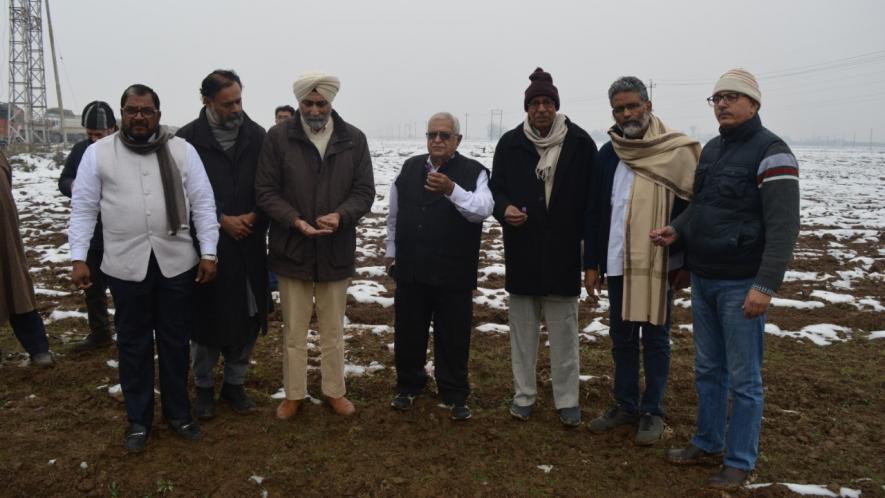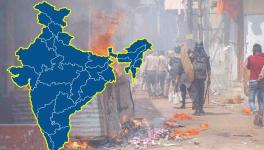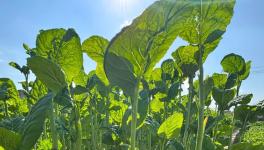‘Declare Heavy Snowfall in Kashmir as National Calamity, Compensate Farmers’

New Delhi: As the lockdown in Kashmir after abrogation of Article 370 completes 100 days, the Valley is in the grip of a heavy snowfall, adversely impacting food, water and electricity supplies.
In addition, the apple economy of the state has taken a huge hit with farmers left with no choice but to leave their produce to rot in the fields due to the clampdown.
To get an insight into the sorry plight of apple growers in Kashmir, the All India Kisan Sangharsh Coordination Committee, a nationwide platform of 250 farmers' organisations, recently visited the Valley over a span of three days. The team included V.M. Singh, Convenor, AIKSCC, Raju Shetty from Swabhimani Shetkari Sangathana,
Yogendra Yadav from Jai Kisan Andolan, P Krishnaprasad from All Indian Kisan Sabha, Prem Singh Gehlawat from All India Kisan Mahasabha, Satyawan from All India Kisan Khet Majdoor Sangathan and Swastik from Swabhimani Shetkari Sangathana
The delegation, which documented a first-hand experience of the plight of the farmers in the areas of Ganderbal, Pampore, Pulwama, Kulgam and Anantanag, found that horticulture, the backbone of the state's economy, had suffered a double blow this season.
Just when a good crop had given the farmers hopes for a recovery from last year's losses, the political turmoil since August 5, has badly affected the transportation industry and procurement market; thus all stakeholders in the fruit industry were unable to harvest and store the fruits in cold storage on time, the delegation said at a press conference here on Saturday.
They noted that crops like pear, cherry and grapes, which were harvested in August, were stranded due to complete shutdown in the Valley and could not be marketed, leading to a near total loss for farmers.
“When the farmers began harvesting, non-availability of telephones for first 60 days and non-access to internet meant that communication between apple growers, transporters and traders was snapped, causing a disruption in the demand-supply chain,” they said in a statement released to the press.
Additionally, farmers could not bring apples to the procurement markets since trucks were not allowed to go to the villages and farmers were forced to bring their produce to the highways. This caused delays, inconvenience and additional costs.
“Transport cost almost doubled due to prevailing security threat and unavailability of trucks. Frequent transport blockades and closure of highways resulted in further delays and loss of quantity and quality of apples during transportation,” the statement read.
The delegation’s report also stated that the government authorised NAFED to carry-out procurement, however, this did not yield any gains as lack of experience and infrastructure meant that NAFED has procured only 0.01% of the estimated produce (1.36 lakh boxes out of more than 11 crore boxes).
Moreover, the farmers complained that NAFED procurement had disruptive effect since it has sold apple at lower prices that brought down the wholesale apple prices in the procurement market.
“Not just farmers, sheep breeders also suffered badly due to the turmoil leading to sharp reduction in the sale of goats and sheep,” the farm organisations noted.
Besides this, horticulture in the state has been badly hit by untimely and very heavy snowfall throughout the valley on November 7. The AIKSCC delegation said it witnessed extensive damage to apple trees, which will affect production for the next 3-4 years.
Estimates of the damage to apple orchards were also noted as varying from 35% (estimated by the Director, Horticulture) to over 80% (reported by farmers and farm organisations) in regions like Shopian, Ramnagar, Kellar, Jamnagar, Sedaw and Mirpura . The impact on saffron crop was much worse: this year the yield is expected to be between 1/6th to 1/8th of the average production.
The report added that despite these glaring realities, the Kashmir administration has not declared it a calamity, nor has it initiated any field level survey so far to estimate the extent of damages. There was no consultation with the representatives of growers as well as commerce and industry by the administration.
Kashmir produces 75% of the total apple production in the country and the horticulture industry of Kashmir has a turnover of Rs 10,000 crore annually. If 70% loss (as is being claimed by the growers and representatives of commerce and industry) is true, then this will devastate the livelihood of the people of Kashmir for years to come, they said.
Following this, the delegation demanded that the unseasonal, heavy snowfall in the Kashmir valley must be declared a “National Calamity" and farmers must be adequately compensated for the losses suffered due to natural disaster as well as the lack of transport and cold storage assistance due to the political turmoil in Jammu and Kashmir.
It has also asked the administration to write off the loans of affected farmers and in the meanwhile reschedule KCC loans/extend long term interest free loan to all apple and other Fruit growers.
Also Read: J&K: Early Snowfall Causes Massive Losses to Apple and Saffron Cultivators
Get the latest reports & analysis with people's perspective on Protests, movements & deep analytical videos, discussions of the current affairs in your Telegram app. Subscribe to NewsClick's Telegram channel & get Real-Time updates on stories, as they get published on our website.
























